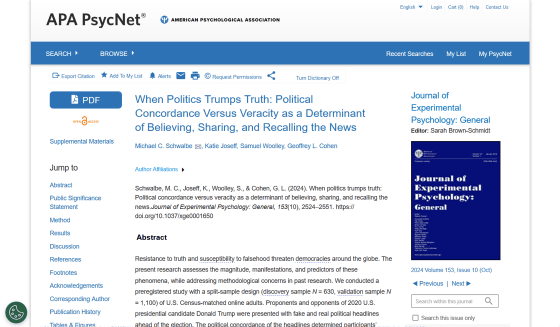Research shows that both conservatives and liberals are more likely to believe news that matches their political beliefs

Fake news about politics has a serious impact on the real world, and some people may feel that 'opposing camps are spreading fake news and manipulating the public.' A new study led by psychologists at Stanford University showed that people are more likely to believe 'news that matches their political beliefs' regardless of their political beliefs, education level, reasoning ability, etc.
When Politics Trumps Truth: Political Concordance Versus Veracity as a Determinant of Believing, Sharing, and Recalling the News

News consumers are more influenced by political alignment than by truth, new study shows | Stanford Report
https://news.stanford.edu/stories/2024/10/new-study-shows-that-partisanship-trumps-truth
People trust news that matches their political views- Earth.com
https://www.earth.com/news/people-trust-news-that-matches-their-political-views-even-when-its-fake/
For many years, the common perception of political fake news has been that it is only believed by a small, highly politically biased and less educated portion of media consumers. In other words, the idea that fake news that aligns with one's political beliefs is only believed by a very small, limited group of people.
Subsequent studies have shown that people of all types prioritize the veracity of news over their own political beliefs. In any case, many people may think that fake news is not for people like me, but for more special people.
However, these studies have limitations, such as 'subjects are more likely to focus on the veracity of the news due to pre-questioning,' 'fake news with ambiguous partisanship is mixed in,' and 'because the source of the news is shown, it is easier to trust information from well-known media such as CNN.'

So
The experiment included questions that made it seem like a 'memory-focused study' to distract subjects from the 'truthfulness of the news.' In addition, political headlines that matched either 'supporters or opponents of presidential candidate Donald Trump' were prepared, and the source of the news was not shown, so the focus was only on the headlines. In addition, all fake news was created by the research team, because using fake news that was already a hot topic could cause subjects to realize that 'this was definitely a topic of discussion.'
The fake news stories created by the research team ranged from realistically plausible ones, such as 'Military veterans stay for free at the Trump Hotel in Washington DC' and 'Trump says, 'I don't like poor people,' during a private meeting with business leaders,' to more extreme ones, such as 'Trump defeats chess grandmaster and champion Magnus Carlsen ' and 'Trump attends a Halloween orgy dressed as the Pope.'
The fake news stories were accompanied by captions of 32 to 71 words and were randomly mixed with real news stories and presented to participants. The research team mixed in other questions to gauge how much participants believed the fake news.

The analysis showed that both pro-Trump and anti-Trump subjects rated real news as more believable than fake news. However, the tendency to believe the news was strongly influenced by the subjects' political beliefs, and they were more likely to believe news that matched their political beliefs.
Moreover, the political bias was stronger for real news than for fake news, meaning people were more likely to disbelieve news that contradicted their political beliefs, even if the news was real.
These tendencies to prioritize consistency with political beliefs over veracity when deciding whether to believe the news cut across not only political beliefs, but also educational background and reasoning ability. 'We found an effect in which people are influenced by political consistency over truth,' Schwalbe said. 'This tendency was seen across both political positions and among people who scored well on the reasoning test. We were a little surprised that this tendency was so widespread. People showed strong resistance to 'inconvenient truths.''
'Everyone thinks the other person has a problem. People say, 'It's not me!' But as with a lot of social psychology research, we find that this problem is actually quite widespread, cutting across party affiliation and education levels,' said study co-author Jeffrey Cohen, a professor of psychology at Stanford University. 'The problem isn't just misinformation, it's our own mental filters.'
Related Posts:
in Science, Posted by log1h_ik







